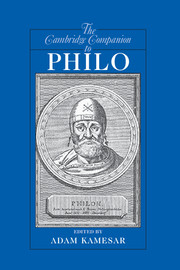Introduction
Published online by Cambridge University Press: 28 November 2009
Summary
Philo of Alexandria (ca. 15 BCE - 45 CE) stands at the crossroads of three great civilizations of antiquity: the Judaic, the Greek, and the Christian. Philo's primary heritage was that of biblical Judaism, but in the form it had taken on in the Diaspora of the Hellenistic world. His chief literary medium was biblical exegesis, but he sought to interpret the Scriptures by reference to the most advanced and sophisticated systems of thought of the times, which were those of Greek philosophy. In theology and what was called 'physics', the system of primary importance for Philo was that of Platonism, and in ethics that of Stoicism. However, Philo's attempt to assimilate biblical and Greek thought often finds closer parallels in the Christian world than in a Jewish or a pagan environment. Indeed, Philo came to be appreciated more by the later Christian Fathers than by the Rabbis or the Greek philosophers of the Roman imperial age. In view of his background and influence, the writings of Philo are of fundamental importance for the understanding of Judaism, for the history of Greek philosophy, and for the study of early Christianity. Within the context of the history of Greek literature as well, Philo appears to have lived across the span of the eras in more than simply a chronological sense. For in his writings he assumes many guises and, in a manner of speaking, emerges as a representative of different epochs. At times he is a man of science or a practitioner of the technical disciplines such as grammar and advanced literary study as they had developed in Hellenistic times. At other times, his moralizing diatribes and rhetorical displays have much in common with the popular philosophical literature of the early imperial age.
- Type
- Chapter
- Information
- The Cambridge Companion to Philo , pp. 1 - 6Publisher: Cambridge University PressPrint publication year: 2009



